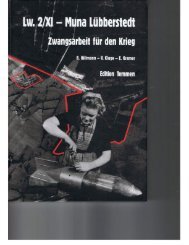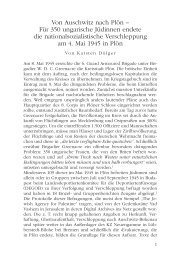The Kallos Family Book 2022
Always remember and tell the story to the world
Always remember and tell the story to the world
- TAGS
- barbara lorber
You also want an ePaper? Increase the reach of your titles
YUMPU automatically turns print PDFs into web optimized ePapers that Google loves.
PART 2: THE LAZAROVICS FAMILY • 45
Samuel Lazarovics in Czechoslovakia
Under Czech rule the situation of Jews improved
but some Jews continue to support the defeated
Hungarian empire. Samuel was one of them. In
Czechoslovakia, having been blacklisted as a Hungarian
supporter who demonstrated against the
Czech government, Samuel became persona non
grata, which meant he could no longer continue
to work in his butcher shop. In 1920 newlywed
Avraham and Berta Ruttner moved into 35
Hustska ulica, just two doors away from the Lazarovics.
Berta owned a delicatessen and food store
– Berta Ruttner’s Mixed Grocery Store – which she
ran from the front of their home. Avraham, who
owned a successful apple exporting business,
often did his paperwork at home and helped his
wife in the store. It is likely that is why, with time
on his hands, Samuel often visited his neighbours,
whose company he enjoyed despite an age
difference of about twenty years. Even though
the Ruttners and Lazarovics were friendly neighbours
for years, Biri Kallos and Lily Ruttner did
not meet each other until the early 1940s.
In order to make an income, Samuel’s wife
Sarah, together with their youngest daughter
Ilonka, opened a delicatessen and coffee house
in the town centre on Hlavní ulica. They rented
a large space from the aristocratic Hungarian
Mandics family, who owned a lot of property in
Ťačovo. The delicatessen was in the front of the
shop and at the back, separated by a curtain,
was a coffee lounge. The coffee lounge served
only a sweet breakfast of túrós delkeli, a cheese
pastry particular to that region, similar in style
to a soft flaky Danish pastry filled with cottage
cheese that was a served with very hot coffee,
especially during the long, cold winters. Due to
the unavailability of coffee beans at that time,
the beverage was made from malt, which tasted
similar to coffee.
As good cooks and bakers specialising in
delkeli, Sarah and Ilonka attracted businessmen
from all over the Ťačovo district. Ilonka, who
lived with her parents, was a hard worker; at
night, after the café closed, she made the dough
for the next day’s bake. Then, in the morning,
she rose at 4 o’clock to bake. Walking almost
2 kilometres through the snow in winter, in heat
in summer she carried the delkeli to the shop.
Ilonka also took sweets and chocolates from
the delicatessen to sell at dances held at the
Korona Hotel. Biri recalls going with Babi to the
dances where the non-Jewish Hungarian boys
bought chocolates from Ilonka and stuffed them
into the girls’ pockets when they danced. Biri
and Babi would return to the Kallos Hotel with
pockets full of chocolates. Lily Ruttner was not
permitted to accompany her girlfriends on this
night outing as her parents were religious and
did not approve of their daughter mixing with
non-Jewish boys.
Hungary reoccupies Ťačovo
Samuel was very happy when, in March 1939, the
Hungarians marched back into Ťačovo, unaware
that these Hungarian soldiers were Nazi collaborators
who grew up in a Hungary that blamed
the Jews for the dismemberment of the Austro–
Hungarian empire following its defeat in World
War 1. In her 1999 interview that was conducted
in Rotterdam, Biri Kallos recalled this incident
concerning her grandfather.
Samuel had this little beard. He was a very
handsome man with a little beard. A young
soldier approached him and pulled his beard.
He then gave him a slap in the face; a young
lad of, let’s say, 20 years, lays hands on a man
who was such a great patriot and was already
more than 60 years old. I have never seen my





